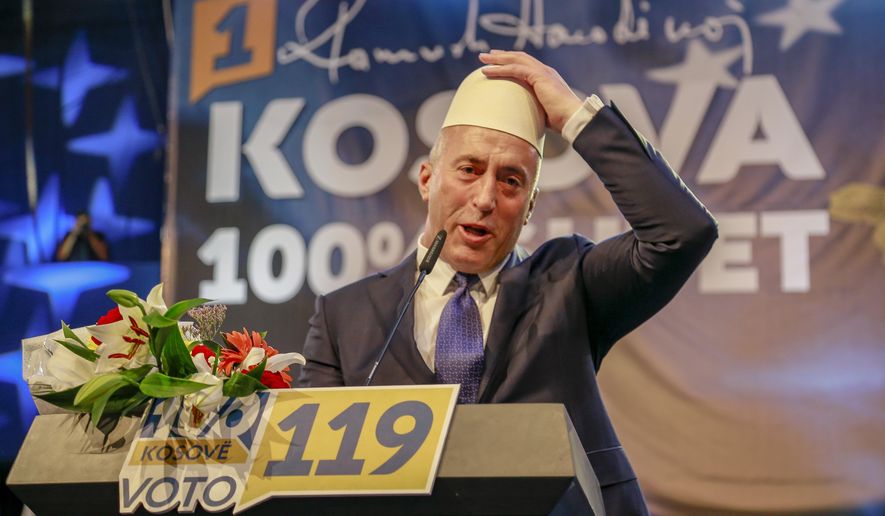PRISTINA, Kosovo (AP) - Kosovo is holding an early general election Sunday amid calls for leaders to resume dialogue with Serbia over normalizing ties.
The vote comes after the outgoing prime minister resigned following a request from a Hague-based court to question him over crimes against ethnic Serbs during and after the country’s 1998-99 war.
The election will be Kosovo’s seventh since the end of the war, and 1.9 million people are eligible to cast ballots to elect 120 lawmakers.
Kosovo’s 2008 independence from Serbia has been recognized by more than 100 countries but not by Belgrade. European Union-sponsored talks aimed at normalizing ties between the two countries stalled last year over Kosovo’s decision to impose a 100% tax on goods from Serbia.
Other issues in the election include bringing down the unemployment rate which stands at more than 25%, organized crime and corruption. No single political party is likely to win the vote on its own and coalitions have always proved hard to form and easy to fall apart.
The outgoing prime minister, Ramush Haradinaj, having been questioned in The Hague but not charged, is standing for re-election with his Alliance for Kosovo Future. He faces Vjosa Osmani of the Democratic League of Kosovo, the first-ever female candidate for prime minister in the country; Kadri Veseli of the Democratic Party of Kosovo; and Albin Kurti of the Self-Determination Movement Party, which has used extreme methods like throwing tear gas and water bottles in parliament to protest against deals with Serbia.
All candidates except Osmani are former fighters of the Kosovo Liberation Army, which triggered the 1998-1999 war that ended when NATO intervened on behalf of the Albanian majority.
Kosovo’s relations with Serbia have soured further recently after Haradinaj set a 100% tariff on Serb and Bosnian goods last year as a way to get Serbia to recognize Kosovo and to end efforts to prevent it from participating in international organizations.
All political parties, except for Haradinaj’s and one closely allied to him, have criticized the tariff. Fearing a loss of votes, none has explicitly said they would lift or suspend it and resume talks, despite pressure from the U.S. and EU.
Instead, Osmani and Kurti say the tariff should be replaced with reciprocity in the application of 33 agreements signed with Belgrade since 2011.
“That was a perfectly legitimate measure although it was done for the wrong reasons,” Osmani said.
“The majority of political parties are clear in their stance to continue the dialogue, to stick to the international partners’ requests,” says Evliana Berani, editor-in-chief of Infoglob, an independent online media page. “I am sure each party will start from the beginning to deal with the tax.”
Though there are no reliable polls before voting, it is believed by political observers that the opposition may have the upper hand because Osmani and Kurti haven’t been embroiled in widespread corruption scandals.
Trade, retail and construction are the main sectors of the economy and the industrial sector is weak. The country also has a strong dependence on remittances from the diaspora, mainly in Germany and Switzerland, which has reached up to 14% of gross domestic product.
“Kosovo is at a crossroads, with high level of unemployment and poverty, with high level of migration and a pessimistic sentiment of the people,” says Berani, convinced that whoever wins the election “will be forced to change drastically the way Kosovo is governed. People are tired of ‘major’ ideas.”
The Serb minority, with 10 seats in the 120-seat parliament, remains a key player in Kosovo, especially since their votes may be needed in a coalition to form a Cabinet, a scenario that occurred two years ago.
The Belgrade-backed Srpska Lista, or Serb List, group is expected to garner the most votes in the Serb-run part of the country amid a fierce campaign that calls for Serb unity. Ten other seats belong to different minorities.
The European Union has sent a 61-member team of observers for the election to show that Pristina “remains a political priority.”
___
Llazar Semini reported from Tirana, Albania. Jovana Gec contributed from Belgrade.




Please read our comment policy before commenting.